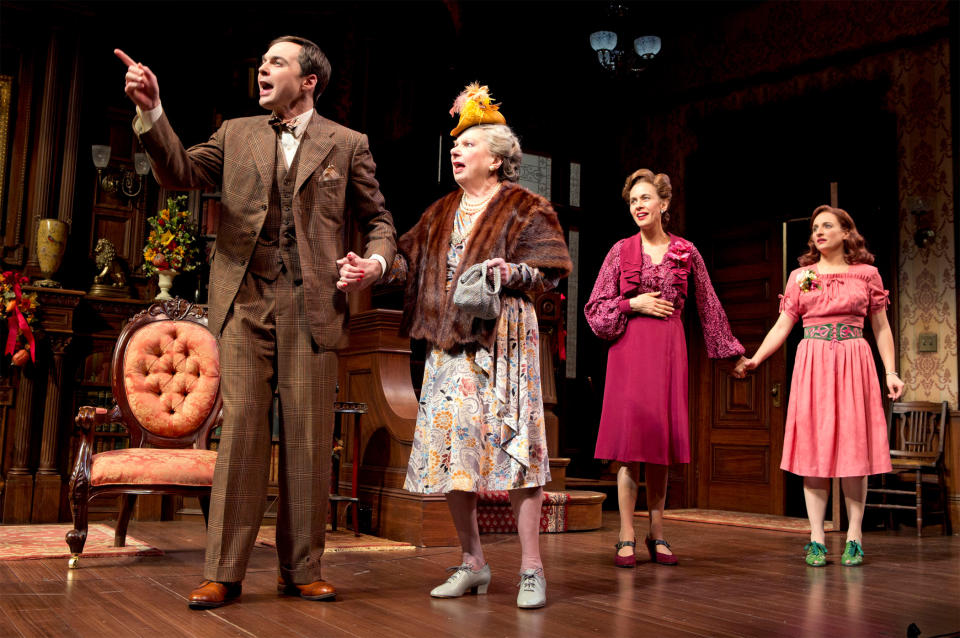Review: Jim Parsons finds 'Harvey' an illusion
NEW YORK (AP) — Much more than a 6-foot rabbit is invisible at the new revival of "Harvey" on Broadway. So is any real reason to see it.
A recent preview of The Roundabout Theatre Company's dull production starring Jim Parsons triggered plenty of yawning in the audience and revealed cracks in a play that's supposed to celebrate American individualism and lampoon social conformity. It opened Thursday at Studio 54.
At "Harvey," there is overacting and under-acting, poor sound quality and endless windups for lame payoff jokes. And it is led by an actor who seems to be completely shorn of any charisma. Parsons, who plays a hard-core physicist nerd on "The Big Bang Theory," has merely transferred his pursed-mouth, vaguely creepy and unsocialized TV character to the stage. With no laugh track. For two hours.
Parsons steps into the big shoes of Jimmy Stewart to play Elwood P. Dawd, a far-too-pleasant man who has been left some money, spends it on booze and is accompanied by a tall white rabbit, an invisible creature only he sees called Harvey.
Elwood's embarrassing eccentricity is messing up his sister Veta's attempt at furious social climbing. She schemes to get him committed, gets committed herself and that's when the mistaken-identity farce begins. The big question is: Who is really crazy? The better question is: Who really cares?
Mary Chase's play is six decades old and creaks. It's hard to imagine how it beat Tennessee Williams' "The Glass Menagerie" for the Pulitzer Prize in 1945. Clearly, the concept of two best friends that are not of the same species owes Chase a debt and there are quite a few lately — like the TV show "Wilfred" with Elijah Wood and the talking teddy bear in Mark Wahlberg's new movie "Ted," both showing that a true animal best friend is really that person's unfiltered id.
But, in other ways, Chase's play is stuck in 1944, especially when it comes to how society looks at committing the mentally unwell. The romantic notion of simply opening the doors of the nation's sanitariums is past.
As for the cast, "Harvey" director Scott Ellis hasn't really gotten much gelling done. Larry Bryggman is great but somewhat wasted as Judge Omar Gaffney. Charles Kimbrough is perfectly cast as the blustery sanitarium owner, William R. Chumley. And Carol Kane achieves a luminous form of loopy grace in a tiny role as Chumley's wife.
But Jessica Hecht as Elwood's sister and Tracee Chimo as her daughter are shrill and irritating — especially the strange sexed-up fondling of herself by Hecht after being manhandled and dunked in a tub in the mental hospital, which pretty much never awakens people's libido.
Three sanitarium employees — Morgan Spector, Holley Fain and Rich Sommer — are good enough to have their own spin-off show, what with all the bickering and misunderstandings. They're in another play, it seems. David Rockwell's two sets — an elegant mansion's library with rich colors and well-appointed furniture versus the all-white, sanitized sanitarium — nicely contrast the two worlds.
So much of this play rests on the shoulders of Elwood, and Parson's aren't broad enough. While he has flickers of likability, such as lighting up when he meets new people or brilliantly defanging a bully with just words, he's often just an odd duck, to mix metaphors. He also makes the cardinal sin of not letting the audience really see Harvey with his halfhearted miming.
Parsons showed some gift for the stage in the recent Broadway revival of "The Normal Heart," allowing a wry urgency to appear in his role of an anti-AIDS activist. Here, it's just more Sheldon Cooper, if Sheldon Cooper was an alcoholic with a poor grasp of reality.
"Harvey" will make you see things, indeed. The closest exit.
___
Online:
http://www.roundabouttheatre.org


